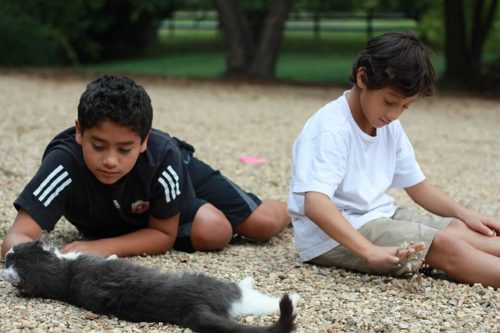
“There are friends, there is family, and then there are friends that become family.” Such can be said about the relationship between humans and cats. Beautiful irresistible creatures who have warmed their way into our homes. And they make lovely furring companions for their humans, especially for children of all ages.
Besides bringing love, fun, and companionship to their owners, cats can impart important life lessons and values to your children at a tender age.
Without further ado, here are five (5) life lessons children can learn from their pet cats.
1. The Importance of Personal Space
I know, you might be wondering why this is top of the list. Research about how best to help your children develop a sense of personal space is incredibly deep, and personal space is an essential social skill your children must learn at a very tender age. No doubt, kids love to explore and try new things. That explains why they always want to touch, lick, poke, and handle everything and everyone that comes their way. At this stage, they don’t realize some things (or people) are off-limits.
Cats, on the other hand, don’t always like their personal space being invaded. Sometimes, they flat-out want to be left alone. They react, hide, or move away when kids pull their eyes, ears, tails, or furs. With time, your children learn these little things annoy them. They will transfer this lesson to their relationships with humans by treating others with kindness and respect and respecting boundaries.
2. Sense of Responsibility
As parents, we want our children to grow up to become responsible adults. Allowing your children the opportunity to feed the cats and groom them increases their sense of responsibility. Plus, cultivating this good habit in them at a tender age makes them develop confidence in their skills and abilities, thereby honing their leadership skills.
3. Empathy
Research shows that children who grew up with a pet cat are highly empathic people compared to those who didn’t. Caring for a pet cat means going out of their way to do kind acts for them and understanding how their cat feels in different situations. This makes children selfless. And to be selfless will, in turn, make them compassionate towards others.
4. Important Social Skills
When kids take their pet cat for walks outdoors especially in the park with other children or relaxing in the yard with their feline friend, it creates the perfect environment for them to converse with other families and their pets to interact. Kids feel excited to share their experiences with friends and neighbors about their cat’s personalities, food preferences, and so on, and this encourages the development of important social skills in these children.
A study conducted by Frontiers in Veterinary Science states that “cats in families with an ASD child often provided valuable bonding, attention, and calming affection to the child. ” Effectively, having pet cats in the household improves the social skills of children with autism. Having good social skills is crucial for better mental health in general.
5. Physical Well-being
Children observe and watch everything and everyone around them. They learn things by copying what others do. Cats have a singular talent for keeping themselves clean; the level of commitment they put in grooming themselves is astounding. They spend a lot of time grooming themselves. This habit can be an example of how personal hygiene is important to your children.
Cats also spend a lot of time sleeping; it’s like sleep with a capital ‘S’. Your child can easily pick up this personality trait as quality sleep has been proven to improve a child’s physical and mental health.
How To Prevent Kids From Having Accidents With Cats
It may take some time for children to understand how best to interact with their pet cat who has only recently been adopted by the family, and sometimes things get messy in the house. Sometimes, cats hide and pounce on the children, making them fall down. Pay attention if you have a toddler since they have less stability to keep the balance after the cat jumps on them. Cats do this either for seeking attention or simply playing.
To prevent this, you must teach your cat not to do this by discouraging this behavior every time you see it. Sometimes a simple no! will do. You can also teach your children to understand basic feline body language which would help a great deal in preventing any type of sudden reaction from the cat. This will also improve their chances of learning from these beautiful creatures. They should understand when a cat is angry, scared, or stressed. They should also know when it’s playtime and alone time.
Cats have boundaries, teach your children to respect these boundaries. All these would avoid a bad situation with your pet cats. Parenting is a never-ending job and sometimes can be stressful, but having these little feline companions can make it a lot more exciting.
Some content contains affiliate links or samples for reviews; I may receive compensation. Learn more
Leave a Reply